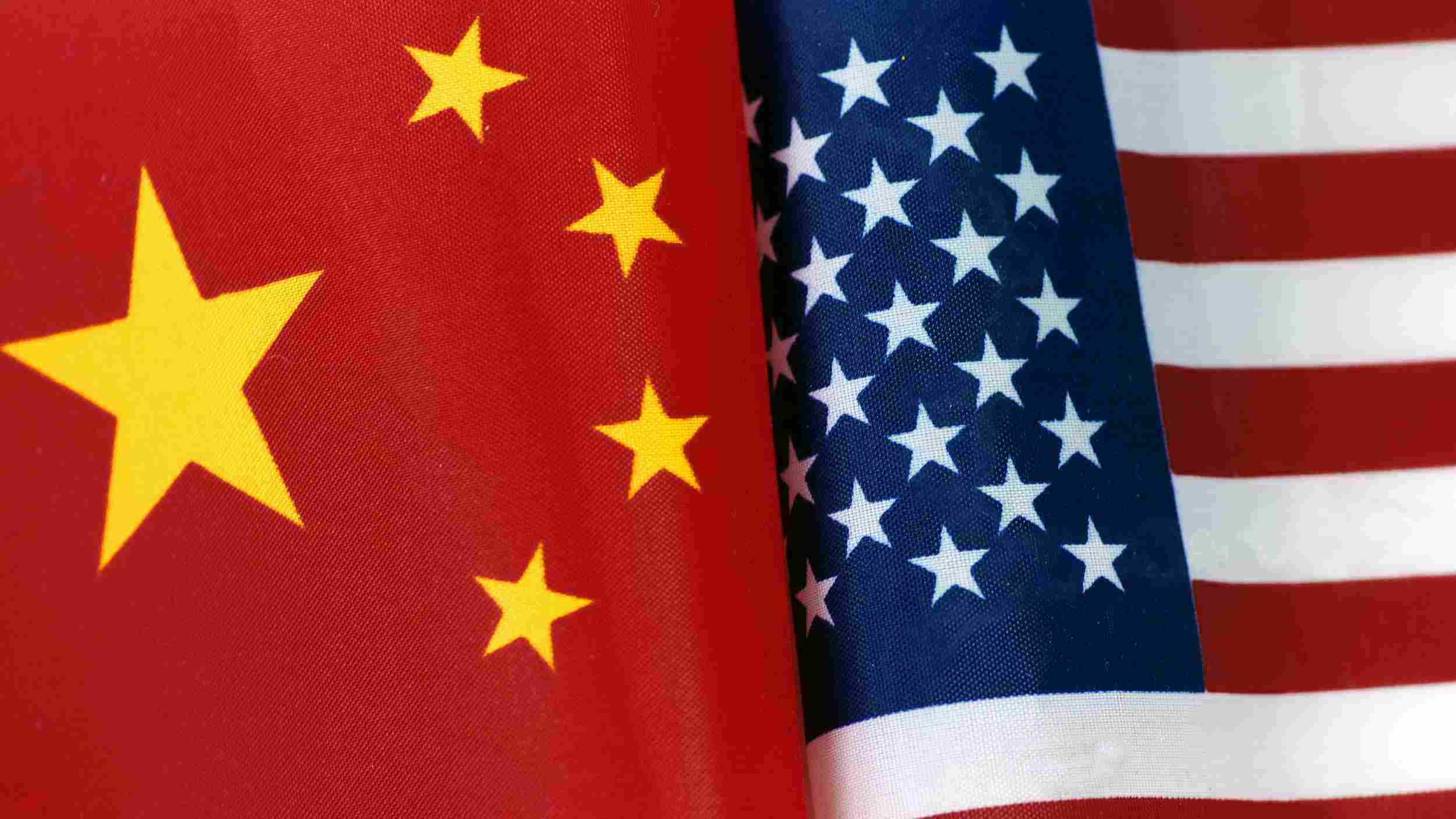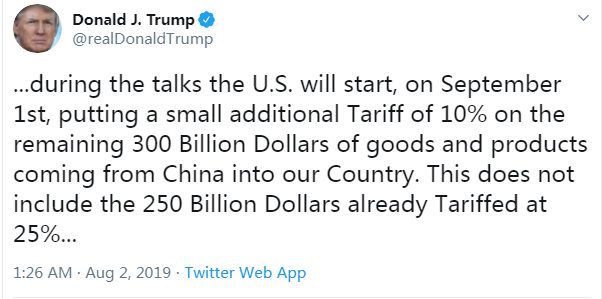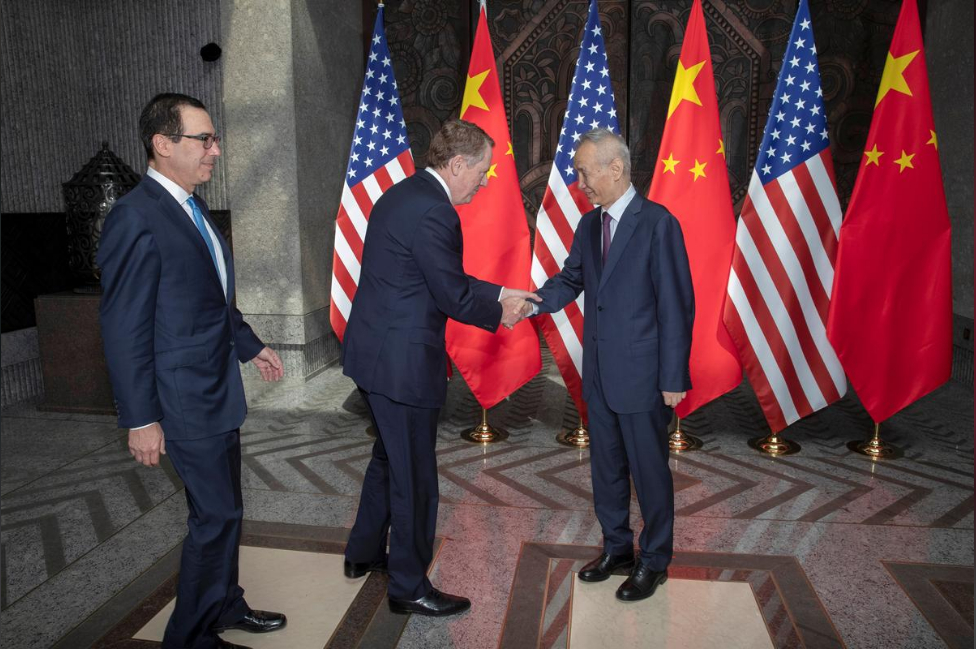

Editor's Note: Tom Fowdy is a British political and international relations analyst and a graduate of Durham and Oxford universities. He writes on topics pertaining to China, the DPRK, Britain, and the United States. The article reflects the author's opinions, and not necessarily the views of CGTN.
Just a day after a new round of trade talks concluded in Shanghai, U.S. President Donald Trump announced on Thursday evening through Twitter the U.S. would be placing a 10 percent tariff on the remaining 300 billion U.S. dollars of remaining imports from China, starting September 1.
The president subsequently threatened to raise the new levies to 25 percent. To justify the new measures, he claimed that Beijing did not live up to its promises of purchasing American agricultural products and did not stop the flow of Fentanyl into the United States, where it can be misused to create narcotics. He again accused China of backtracking on a previous deal in May.
In response to the announcement, American markets, which had previously been buoyed by the confidence of a G20 summit breakthrough between the two giants, tanked. Almost instantly, Dow Jones, and S&P lost one percent of its value; the United States Chamber of Commerce openly criticized the decision, stating the new tariffs "will only inflict greater pain on American businesses, farmers, workers and consumers, and undermine an otherwise strong U.S. economy." Despite this, Trump told reporters in a follow up interview that China is "paying for the tariffs."
In raising the stakes yet again, the president makes his intentions clear: He believes that through increasing pressure he can make China capitulate to accepting one-sided terms exclusively favorable to the United States.
He has shown little interest in pragmatism or compromise. Every time the president has had the opportunity to clinch an agreement and end the trade war, he has instead chosen to escalate it and pursue more belligerent tariffs against Beijing under dubious pretences.
The reason we are now in this position is because Beijing has made it clear that capitulation or appeasement cannot be the foundation of any agreement. Rather than forcing China to heel, Trump's strategy is in ultimately hardening their stance than making them more obligatory to hand over what he wants. Beijing is open to honest, sincere and reciprocal negotiations, but not bullying or coercion.

A screenshot of U.S. President Donald Trump's Twitter account.
Donald Trump's foreign policy has been more focused on coercion than any other president in contemporary American history. The notion of "Make America Great Again" creates a diplomatic approach favoring naked self-interest unilateralism.
On every issue, the White Houses' playbook involves a simple solution to threaten countries into handing over what Washington through threats of tariffs, sanctions, aid cuts, withdrawal of military and intelligence cooperation, and worse, military action. If a country resists, the answer is always to increase pressure on them.
Such a strategy, combined with the presence of strident China hawks in his trade negotiating team, has very much shaped his attitude towards negotiations with Beijing. The president is led to believe that through increasing tariffs that he can force China to capitulate to one-sided, U.S.-centric terms which would displace their own economic interests.
In pursuing this, he has shown little interest in pragmatism or compromise, choosing instead to escalate every time he was unable to get everything he wanted. If he was serious about securing a deal, he has had several opportunities to do so already.
Since Trump's last escalation in May however, China has demonstrated clearly that they cannot accept any agreement built upon capitulation, insisting that talks must be fair, reciprocal and level-headed. Beijing can compromise, but Washington must respect their fundamental economic interests. Concessions must be earned, not extorted.
As a result, the U.S. attitude has meant ongoing talks have been slow and tense, which in turn is the likely driving logic of Trump's decision to yet again escalate tariffs.
The president appeared to complain on Twitter a few days ago that China was dragging out negotiations and he accused them of wanting to wait until "2020." It seemed evident that he was frustrated, that he was being denied the quick, one-sided political victory he is looking for.

Chinese Vice Premier Liu He (R) welcomes United States Trade Representative Robert Lighthizer (C) and Treasury Secretary Steve Mnuchin (L) before holding talks in Shanghai, China, July 31, 2019. /Reuters Photo
Thus again, his solution is more pressure, hoping that in the space of a month he can scare Beijing into offering better terms.
On this however, the new levies will change nothing in his favor. If Trump is finding problems negotiating with Beijing now, he himself is the problem. The repeated use of coercive tariffs is only likely to make China more determined to protect their national interests by giving the impression the president has little interest in fair, sincere or good-will negotiations.
Meanwhile, as this saga wages on, there should be no mistake made about it that a 10 percent levy on 300 billion U.S. dollars' worth of imported goods will be absolutely devastating to American businesses, markets, and consumers. Costs across the board will rise, and every aspect of individual life is bound to be affected.
Trump is playing a dangerous game, and it should be clear at this point that the trade war cannot end through coercion.
(If you want to contribute and have specific expertise, please contact us at opinions@cgtn.com.)

Copyright © 2018 CGTN. Beijing ICP prepared NO.16065310-3
Copyright © 2018 CGTN. Beijing ICP prepared NO.16065310-3